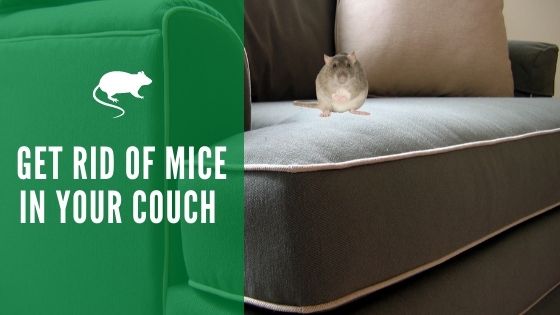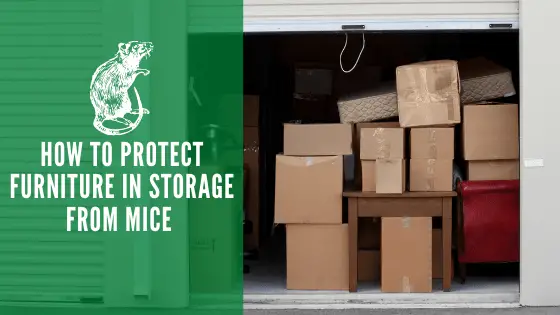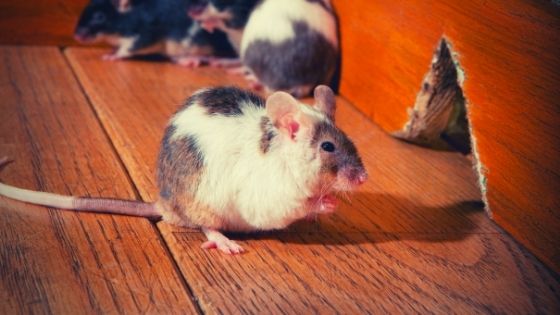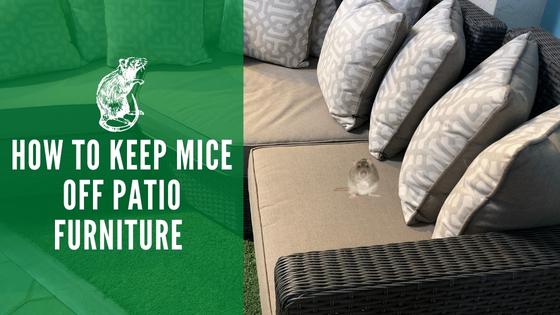How to Get Rid of Mice in Your Couch

Mice are annoying invaders in our homes. They are destructive, will chew through food containers, and nest in furniture. Not only that, they carry diseases, and they can destroy your couch. Let’s explore some ways to give them an eviction notice and get rid of them for good.
Can Mice Live in Couches?
Mice love our homes as much as we do, and a couch is perfect for raising a family.
A couch makes the perfect place to set up a nest for breeding. They can easily tear holes in the cover and have a place that feels safe from the outside world. It is dark, and they can use the stuffing to make a nice, warm nest for their babies.
Mice love places that are hard to reach by humans and pets, especially cats. They also have quick access to food and water in your kitchen. They can travel using the interior of the walls and have a smorgasbord only a few feet away. Mice also love to hide in storage boxes, attics, dryer vents, utility closets, mattresses, walls, and behind appliances.
Mice tend to stay quiet and in hiding most of the day. They will come out at night and try to stay within a short distance of their hiding place. If you turn on the light and see a mouse scampering away, watch where it goes, and you will have a clue as to its hiding spot.
Signs of Mice in a Sofa
Droppings & Urine
One of the signs that mice are in your couch is that you keep finding fecal pellets (droppings) in and around it. Mice drop about 70 fecal pellets a day, which is about 25,000 per year. You also might notice a urine smell around the couch. When cleaning mouse droppings and urine around your couch, make sure to use personal protective equipment and a strong disinfectant to avoid exposure to dangerous diseases like the hantavirus. More about this later in the article.
Other Signs
Another sign that you might have mice in your couch is that you might hear scratching noises, squeaks, or movement inside the couch. If you find bits of stuffing or foam on the floor, you probably have mice. Sometimes, you might catch a glimpse of movement out of the corner of your eye, but when you look, there is nothing there. This could be a mouse, especially if it happens at night. You should also closely inspect your couch for small entry holes.
If you have mice in your couch, you probably have signs of mice throughout your home, too. The most likely place is in the kitchen. You might have containers of food chewed, or you might see feces in your cupboard. You also might find signs of mice in piles of dirty clothing or clutter.
How to Get Rid of Mice in a Sofa?
The best way to protect your furniture from mice is to address the problem of mice in the house altogether. You have many good reasons to have a zero-tolerance policy against these common pests.
One of the easiest things you can do is eliminate their food and water sources to make your home and furniture less attractive.
This means making sure to clean up any dishes or food scraps at night, taking out the trash, and not leaving pet food or water out.
You must also find out where they are getting in and seal the hole. This can be difficult because they can fit through an extremely small hole the size of a dime. The best places to look are in dark corners, closets, under cabinets, in vanities, and behind furniture. You also might find that they are getting in where pipes or utilities enter the house from the outside.
Now that you have reduced food sources and water sources and taken steps to prevent others from entering, what do you do about the ones that are already in your couch?
The best and most effective method for taking care of a mice problem in your home is to connect with a local pest control professional. Pest control professionals can help you to diagnose the severity of your mouse problem, doing this on your own can be very challenging.
Click here to get quotes from pest control professionals in your neighborhood.
Mouse Traps
If you feel like you can handle the problem on your own you have several different options to choose from when it comes to traps.
Snap Traps
Snap traps kill mice quickly when used correctly. They are the most common type of trap.
Sticky Traps
Sticky traps are a board that contains glue. The mouse gets stuck until you set them free or kill them. One drawback is that you must make sure not to get bit.
Electric Traps
Electric traps work by luring mice into a chamber where they receive a fatal shock. They are designed not to shock pets or humans.
Live Traps
Many people do not like any of these other options and choose live traps. When the mouse enters the trap, a trigger closes the door behind them. It will not reopen until you release it.
Avoiding Poisons
There are many reasons why you should not use poisons. The first is that it can poison pets or be dangerous for children. Also, if the mice do not die immediately, they could spread the poison around your house through rodent droppings and urine.
Declines in hawks, owls, eagles, and other natural predator populations, including a few local pet cats, have been attributed to poisoning mice and rats. You are encouraged to choose a responsible method that will not harm other species, including you.
Some plants and plant oils have been said to repel mice. The most common type of essential oil used to repel mice is peppermint oil. To use it, you can put a few drops of the oil on a cotton ball and place it near the rodent nest. You must replace it when the scent begins to evaporate and is no longer strong.
Another thing to consider when trying to rid yourself of mice using peppermint oil is that it works by covering up the natural scent. If you have a large mouse population, you must reduce the population and thoroughly clean your home for it to work.
Mothballs also repel mice, but they release a chemical that is toxic to humans and pets. Peppermint oil will not harm your pets or children unless they are sensitive.
Do Mice Spread Diseases?
Mice are cute, and some people keep them as pets. Pet mice that are clean and well-kept are not problems, but wild mice can be another story. According to the Centers for Disease Control and Prevention, mice can spread over 35 diseases to humans. You can catch these diseases by handling mice, bites, or exposure to feces (droppings), urine, or saliva.
This means that if you have mice in your home, you and your family are in danger. Some of the diseases you can catch from mice include salmonella, hantavirus, and lymphocytic choriomeningitis (LCM). All of these diseases can be serious or fatal. If mice are in your couch, the couch could make you sick.
Cleaning Mice Droppings
According to the CDC, you should follow these steps:
- Always wear rubber gloves when dealing with mice urine or droppings
- Spray the area with a disinfectant
- Use a paper towel to wipe up the urine or droppings
- Throw the paper towel in the garbage
- Mop or sponge the area
- Wash or throw away the gloves once you are finished
You should not sweep or vacuum up mouse urine and droppings. This is to prevent virus particles from getting into the air. Learn more from this CDC cleaning guide.
Conclusion
The best advice for getting mice out of your couch and out of your home is to address the problem early. Mice can produce a new litter every 25 days with 5 or 6 young, so the problem can get out of hand quickly. Traps are inexpensive and certainly less than new appliances or a new couch.
The best thing to do for your health and peace of mind is to get a trap and take care of the problem immediately. If you feel that you can’t handle a mice infestation, you own it’s best to get in touch with a pest control professional as soon as possible.



